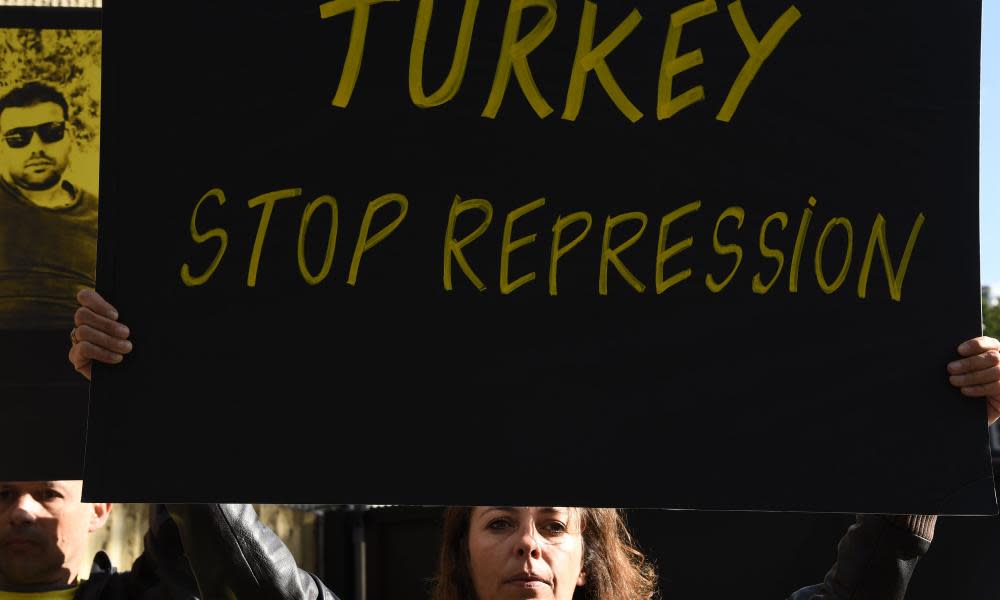EU minister says Turkey still on track to join bloc despite calls to stop accession

The EU’s foreign policy chief defied calls for a tougher line on human rights abuses in Turkey to insist the country remains on track to join the bloc.
Federica Mogherini, the EU’s high representative for foreign affairs, told reporters on Tuesday that it was important to keep a dialogue open with Ankara. “Clearly Turkey is and stays a candidate country,” she told reporters. “Many of our colleagues prefer to focus on the red lines. I prefer to focus on what we have in common.”
The statement, following talks with Turkish ministers, came despite growing pressure on Brussels to show its condemnation of Recep Tayyip Erdoğan, the Turkish president, since the attempted coup last year and the jailing of 50,000 people pending trial over alleged links to the plotters.
Salil Shetty, the secretary general of Amnesty International, said the EU should look to using a host of levers, including its funding to the Erdoğan regime, to persuade it to release human rights activists. Six campaigners, including the local director of Amnesty International, have been held in custody in recent weeks after being accused of belonging to a terrorist organisation. Nearly 900,000 people have signed a petition calling for their release.
Manfred Weber, chair of the centre-right European People’s party, also called on the EU to give “itself the goal of ending the accession talks” with Turkey over the crackdown. “The EU has repeatedly extended its hand to Turkey through various initiatives but Turkish president Erdoğan has consistently spurned it,” he said. “Turkey’s accession to the EU makes no sense.”
Johannes Hahn, the EU’s enlargement commissioner, admitted there were concerns among the member states about the direction of Turkey in recent years, including the constitutional changes made since the referendum last year. “That is why member states have clearly stated that under the current circumstance the the opening of new chapters [in the accession negotiations] is not possible but they have clearly denied to suspend or terminate negotiations,” he said.
However the Turkish foreign minister, Mevlüt Çavuşoğlu, and its EU affairs minister, Ömer Çelik, remained defiant during the joint press conference with Mogherini and Hahn on Tuesday afternoon.
Çavuşoğlu said the Turkish regime made no apology for arresting “pseudo journalists” and human rights activists who they believed played a role in the plot to oust Erdoğan last summer. “They need to face the sentences that are necessary”, he said.
He suggested that the Amnesty International member of staff detained had been in communication with a terrorist organisation. He also attacked the EU for “taking nearly a year” to show solidarity with Turkey since the attempted coup.
In response to claims that Turkey’s accession to the EU should be blocked, Çelik dismissed the suggestion and said that such a move would be a blow to both the EU and Turkey.
Çelik said talks should instead be stepped up. “After the Brexit decision we are pleased to see the EU continues to be strong,” he said. “It’s our common future.”
The German government has taken a tougher line on Turkey than the EU. The German finance minister, Wolfgang Schäuble, has accused the country of acting like communist East Germany by arresting people and denying them consular help. Berlin has also warned about travelling to Turkey and accused its courts of inventing links between human rights organisations and terrorist groups.
Erdoğan has responded to German statements aggressively in recent days, accusing Berlin of meddling in Turkey’s internal affairs. “Our judiciary is more independent than theirs,” he said last week. The Turkish ministers in Brussels accused Germany of double standards but spoke of a need to improve relations.

 Yahoo News
Yahoo News 
